India Nationalism: Gandhian Phase - Beginnings of Socialist Movements | 10th Social Science : History : Chapter 8 : Nationalism: Gandhian Phase
Chapter: 10th Social Science : History : Chapter 8 : Nationalism: Gandhian Phase
Beginnings of Socialist Movements
Beginnings of Socialist Movements
Inspired
by the Russian Revolution of 1917 the Communist Party of India (CPI) was
founded at Tashkent, Uzbekistan in October 1920.
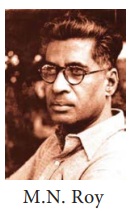
M.N. Roy,
Abani Mukherjee, and M.P.T. Acharya were some of its founding members.The M.N.
Roy British government in India made vigorous efforts to suppress the communist
movement by foisting a series of cases in the 1920s. In a further attempt to
eliminate the threat of communism M.N. Roy, S.A. Dange, Muzaffar Ahmed, M.
Singaravelar among others were arrested and tried in the Kanpur Conspiracy Case
of 1924.
(a) Foundation of Communist Party
The
communists used it as a platform to propagate their views and to expose the
ŌĆśtrue colour of British rule in IndiaŌĆÖ.
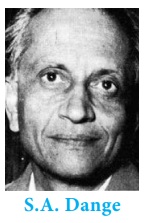
In an attempt
to form a party an All India Communist Conference was held at Kanpur in 1925.
Singaravelar gave the Presidential Address. It led to the founding of the
Communist Party of India in Indian soil. Their efforts eventually led to the
establishment of the All India WorkersŌĆÖ and PeasantsŌĆÖ Party in 1928.
(b) Revolutionary Activities
The
youths who were disillusioned with the sudden withdrawal of the Non Cooperation
Movement by Gandhi took to violence. In 1924 Hindustan Republican Army (HRA)
was formed in Kanpur to overthrow the colonial rule by an armed rebellion. In
1925 Ram Prasad Bismil, Ashfaqulla Khan and others held up a train carrying
government money and looted in Kakori, a village near Lucknow. They were
arrested and tried in the Kakori Conspiracy Case. Four of them were sentenced
to death while the others were sentenced to imprisonment.
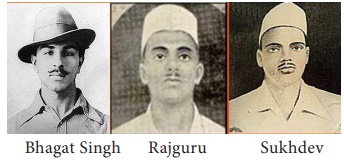
Bhagat
Singh, Sukhdev and their comrades reorganized the HRA in Punjab. Influenced by
socialist ideas they renamed it as Hindustan Socialist Republican Association
in 1928. Sanders, a British police officer, responsible for the lathi charge
that led to Lala Lajpat RaiŌĆÖs death was assassinated. Bhagat Singh along with
B.K. Dutt threw a smoke bomb inside the Central Legislative Assembly in 1929.
They shouted ŌĆśInquilab ZindabadŌĆÖ and ŌĆśLong Live the ProletariatŌĆÖ. He along with
Rajguru was arrested and sentenced to death. Bhagat SinghŌĆÖs daring and courage
fired the imagination of the youth across India, and he became popular across
India.
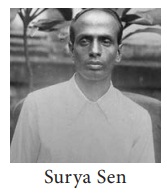
In April
1930, the Chittagong Armoury Raid was carried out by Surya Sen and his
associates. They captured the armories in Chittagong and proclaimed a
provisional revolutionary government. They survived for three years raiding
government institutions. In 1933 Surya Sen was caught and hanged after a year.
(c) Left Movement in the 1930s
By the
1930s the Communist Party of India had gained strength in view of the economic
crisis caused by world-wide Great Depression. Britain transmitted the effects
of Depression to its colonies. The effects of Depression were reflected in
decline in trade returns and fall in agricultural prices. The governmental
measures included forcible collection of land revenue which in real terms had
increased two-fold due to a 50% fall in agricultural prices, the withdrawal of
money in circulation, retrenchment of staff and expenditure on developmental
works.
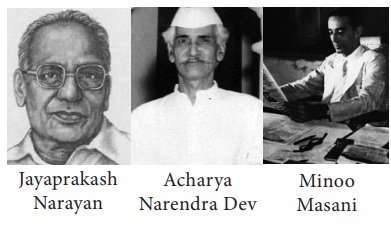
In this
context, the Communist Party, fighting for the cause of peasants and industrial
workers hit by loss of income and wage reduction, and problems of unemployment
gained influence and was therefore banned in 1934. The Congress, as a movement
with a wide spectrum of political leanings, ranging from the extreme Left to
the extreme Right, welded together by the goal of Swaraj, emerged as a powerful
organisation. In 1934 the Congress Socialist Party was formed by Jayaprakash
Narayan, Acharya Narendra Dev and Minoo Masani.
ŌĆśReal Swaraj will come not by acquisition of authority by a few,
but by the acquisition of the capacity by all to resist authority, when abused.ŌĆÖ
- M. K. Gandhi
Related Topics